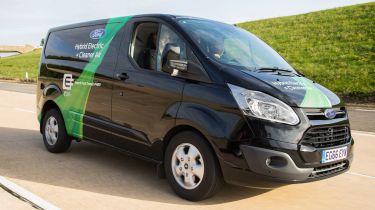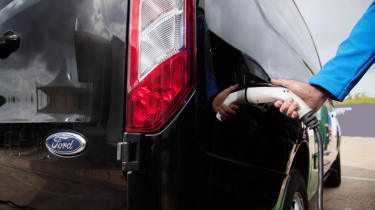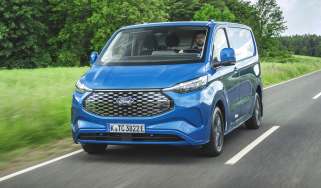New Ford Transit Custom PHEV hybrid van arrives to star in clean air project
Ford is working with 13 organisations in London to trail its new plug-in hybrid Transit Custom vans in a bid to deliver cleaner city air
Set for a production in 2019, the electric Ford Transit Custom van has been shown off to the public for the first time. The Transit Custom PHEV, is designed to have a maximum electric range of 31 miles, a figure that rises to 310 miles thanks to the award-winning 1.0-litre EcoBoost petrol engine featuring as a range extender. The EcoBoost unit does not directly drive the wheels, it will solely help keep the Transit’s batteries charged, and leave the wheel turning to the electric motor.
• Best small vans on sale 2017
Ford has released very little information regarding performance of the Transit Custom range extender van, but we do know that the water-cooled lithium ion battery pack is located under the floor, ensuring the load bay retains the same dimensions as internal combustion-engined version.
On top of this, the design and manufacture of the first 20 vans has been a collaboration between Ford, Prodrive Advanced Technology, Revolve Technologies, and Bosch, with manufacturing taking place here in the UK. Additionally, it is also the first plug-in hybrid commercial vehicle a volume manufacturer.
The fate of the 20 vans is to partake in a 12-month trial, which is scheduled to begin this December, and is supported by a £4.7 million grant from the UK Government-funded Advanced Propulsion Centre. Ford and the other organisations involved (ranging from DPD to the Metropolitan Police) will be subjecting the Transits to the day-to-day stresses of doing business in London. The primary aim of this test, is to assess the impact hybrid commercial vehicles can have an pollution in city environments.
To do this, the vans will be fitted with advanced real-time telematics which will allow people such as the Department for Transport (who will be testing three vehicles), to analyse the information and use the findings to support programmes such as LoCITY – an industry led programme which assists the freight and fleet sectors improve air quality.
Another key aspect of the trail is that the Transits will also feature something called geofencing technology. What this will do is allow the characteristics of the vehicle to be modified automatically based on its location. Meaning, if you are about to drive into a low emission zone, pure electric mode could be activated without having to hunt through a labyrinth of settings.
With approximately 280,000 commercial journeys made in London on a typical working day, the potential to reduce emissions with this tech is huge, especially when you consider the majority of commercial vehicles are diesels.
Do you think projects like this are enough to ensure a greener future for cities? Let us know in the comments below...
Find a car with the experts





